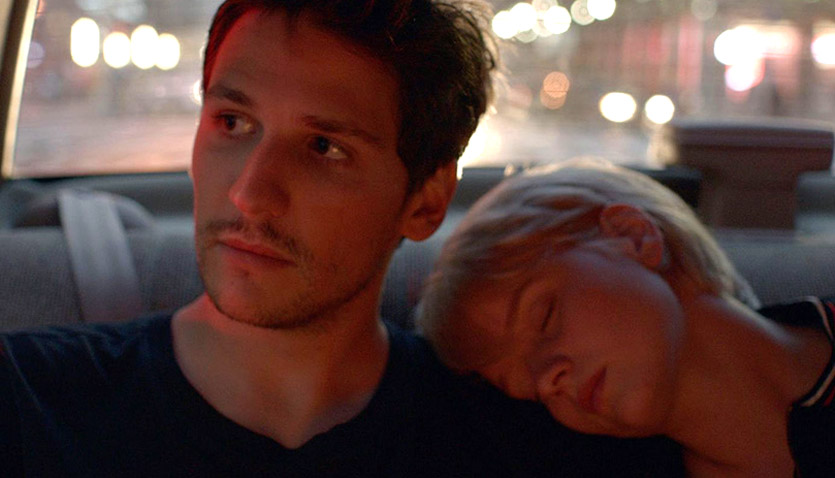
Her career as a director may still be considered short, but Mia Hansen-Løve already has a reputation for capturing the intimacy of relationships. This year, she’s following up 2011’s festival darling “Goodbye First Love” with a much more personal story, intimate in a wholly different way than her previous pictures. “Eden” is a portrait of a young DJ, partly based on her younger brother Sven’s DJ-ing aspirations, and according to the director, who was on hand to introduce the film at its world premiere at TIFF, it wasn’t an easy project to finance, but was one that she was determined to see through till the end. With its slow pace, tricky setting and plotless attitude, it’s not hard to understand why she had some troubles, but we are thankful that she overcame them.
The plot unfolds over the course of 20 years, from 1992 to 2013, following the life of Paul Vallee (Felix De Givry). Together with a close circle of friends, Paul hangs around underground Garage ("like House, but more Disco") clubs, which were just beginning to boom in Paris, and takes a keen interest in the music. Together with a friend, he forms a duo called Cheers and slowly begins to climb up the ranks, from house parties through dingy venues to nightclubs beyond France. With a worrying mother he barely consoles in passing, Paul moves away from home and digs into his savings account to make ends meet while he lives the life of a DJ. He falls for an American in Paris, Julie (Greta Gerwig), and in one of the film’s sweeter moments, dreams of a future with her: “You’ll be a writer, I’ll be a DJ. We’ll be rich.” This amiable naivety perfectly sums up Paul’s character right before Cheers has their breakthrough, and is the first of many ephemeral moments in his life.

Along the way, Paul befriends radio talk show hosts, journalists, other aspiring DJs and has various girlfriends. One of these is fluently charming Louise (Pauline Etienne), who starts off as a friend but ends up being one of the most important relationships Paul has. Two fellow hopeful DJs Paul meets on the way to his future success are Thomas and Guy-Man, who have trouble getting on people’s guest lists until someone recognizes them as Daft Punk and let’s them in. Parallel to this, Paul’s funds continue to deplete as he spends money on getting international guests to appear on his nights and continues to invest in a growing cocaine addiction. Once we get to the late 90s, when Cheers starts to tour in the US, from New York to Chicago, Paul’s lifestyle catches up to him and his youthful exuberance begins to slip through his shaky fingers.
The electronic dance music scene is a tough one to build a cinematic story around and translate into a marketable film. The music mostly consists of rhythmic beats and twitchy sounds. People who frequent after hours clubs are dubbed “ravers” and associated to all kinds of drugs. For good reason, of course—you wouldn’t be able to fling a cat in one of these venues without ruining a line of coke or making someone rolling on ecstasy start hallucinating lions. It’s the kind of world that can only truly be experienced by being in it, but Hansen-Løve (with the help of her brother, who has lived this lifestyle and co-wrote the script with her) finds a way not to alienate the audience. Paul’s preferred sound is built around a fusion of vocals and music. In fact, the international guests he pays dearly for are not DJs but singers. This gives the music a certain kind of humanity that may not be as present in the soundtracks of more niche films like “All Gone Pete Tong” and “Human Traffic.” Secondly, “Eden” is as much about the music as it is a coming-of-age tale for Paul, whose ignorant attitude towards real life responsibilities catch up to him. You can’t get much more universal than that. Thanks to this down-to-earth approach, the director steadily builds a film without traditional plot devices or turning points, and retains her knack of uncovering the complexities of relationships.

De Givry immerses himself into the role, and his acting grows in stature and maturity in parallel to Paul’s development. With only a bit role in Olivier Assayas’ “Something In The Air” before this, one can see how "Eden" was an opportunity for the young man to grow into a professional right before our eyes. Etienne has a bit more experience and portrays Louise with such an appealing subtlety that we found ourselves unwittingly rooting for the couple to remain the one constant throughout this fleeting existence. This sense of life passing you by is captured remarkably well by Hansen-Løve, with gliding interior tracking shots, with the casting of Gerwig in a decorated cameo appearance and even with a bit of animation early on to show the constantly shifting, fragile nature of this way of life.
When asked to describe his sound, Paul says that it’s somewhere between euphoria and melancholy. He may as well be describing the overall tone of "Eden," a film that takes a bit too long to pull the viewer in, but keeps you there once it does. If you have enough patience, especially if you find yourself tapping your feet to the beats, you’ll discover an emotional journey of a young man’s entrance into adulthood. Having electro megastars Daft Punk feature all the way in back of the background is one of the bolder moves that ends up working out for Hansen-Løve. This isn’t a story of success and fortune, but a slice of life with a personal rhythm and a universal beat. [B+]
 This is a reprint of our review from the 2014 Toronto International Film Festival.
This is a reprint of our review from the 2014 Toronto International Film Festival.

